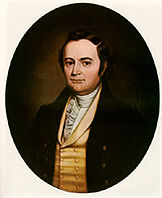United States House election, 1830
|
|
|||||||||||||||||||||||||||||||||||||||||||||||||||||
|---|---|---|---|---|---|---|---|---|---|---|---|---|---|---|---|---|---|---|---|---|---|---|---|---|---|---|---|---|---|---|---|---|---|---|---|---|---|---|---|---|---|---|---|---|---|---|---|---|---|---|---|---|---|
|
|||||||||||||||||||||||||||||||||||||||||||||||||||||
|
All 213 seats to the United States House of Representatives 107 seats were needed for a majority |
|||||||||||||||||||||||||||||||||||||||||||||||||||||
|
|||||||||||||||||||||||||||||||||||||||||||||||||||||

|
|||||||||||||||||||||||||||||||||||||||||||||||||||||
|
|||||||||||||||||||||||||||||||||||||||||||||||||||||
In the United States House of Representatives elections of 1830 the supporters of President Andrew Jackson lost ten seats during his first term, but managed to maintain control of the chamber amidst the growth of two new opposition movements.
The brass style of Congress during the administration of Andrew Jackson caused a number of Americans to become dissatisfied with the government and both of the major parties. Anger over the Tariff of 1828 also provided a major issue, particularly in the agricultural South. The Democrats remained firmly in control of the House, but lost several seats, as did the minority Anti-Jacksonians. The Anti-Masonic Party, an aspiring third party which was based on a single issue (distrust of Freemasonry), was actually able to gain a dozen seats, and four South Carolina Congressman who called themselves Nullifiers (based on the principle of states' rights) were also elected. Thus, this was the first election in the House where both major parties lost seats at the same time; this would not occur again until the 1854 elections.
In the 11th district, William Ramsey (J) died on September 29, 1831, before the first meeting of the 22nd Congress. A special election was held on November 22, 1831 to fill the resulting vacancy, electing Robert McCoy (J)
...
Wikipedia


